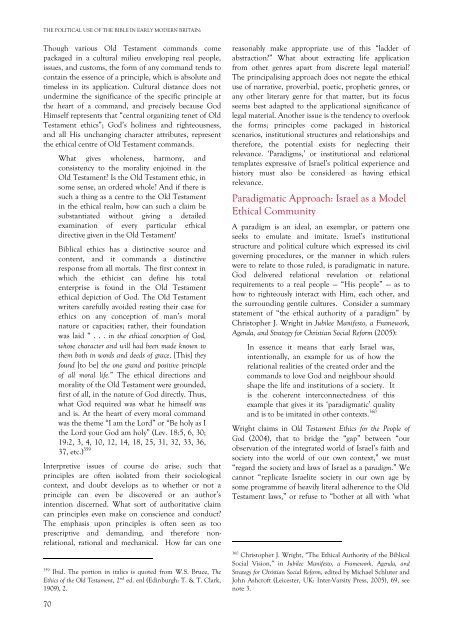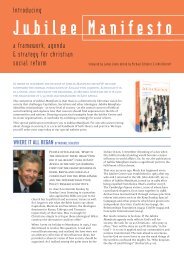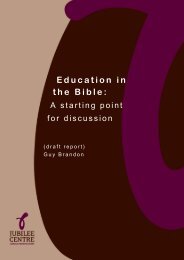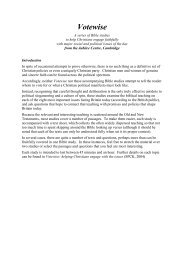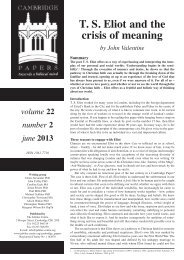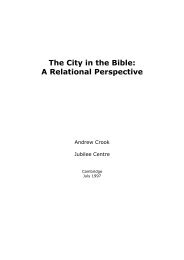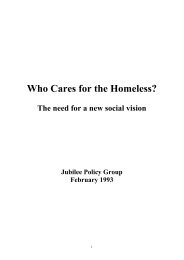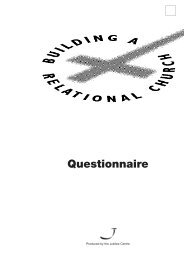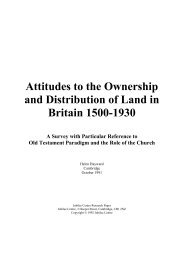Report Template - Jubilee Centre
Report Template - Jubilee Centre
Report Template - Jubilee Centre
Create successful ePaper yourself
Turn your PDF publications into a flip-book with our unique Google optimized e-Paper software.
THE POLITICAL USE OF THE BIBLE IN EARLY MODERN BRITAIN:<br />
Though various Old Testament commands come<br />
packaged in a cultural milieu enveloping real people,<br />
issues, and customs, the form of any command tends to<br />
contain the essence of a principle, which is absolute and<br />
timeless in its application. Cultural distance does not<br />
undermine the significance of the specific principle at<br />
the heart of a command, and precisely because God<br />
Himself represents that “central organizing tenet of Old<br />
Testament ethics”; God’s holiness and righteousness,<br />
and all His unchanging character attributes, represent<br />
the ethical centre of Old Testament commands.<br />
What gives wholeness, harmony, and<br />
consistency to the morality enjoined in the<br />
Old Testament? Is the Old Testament ethic, in<br />
some sense, an ordered whole? And if there is<br />
such a thing as a centre to the Old Testament<br />
in the ethical realm, how can such a claim be<br />
substantiated without giving a detailed<br />
examination of every particular ethical<br />
directive given in the Old Testament?<br />
Biblical ethics has a distinctive source and<br />
content, and it commands a distinctive<br />
response from all mortals. The first context in<br />
which the ethicist can define his total<br />
enterprise is found in the Old Testament<br />
ethical depiction of God. The Old Testament<br />
writers carefully avoided resting their case for<br />
ethics on any conception of man’s moral<br />
nature or capacities; rather, their foundation<br />
was laid “ . . . in the ethical conception of God,<br />
whose character and will had been made known to<br />
them both in words and deeds of grace. [This] they<br />
found [to be] the one grand and positive principle<br />
of all moral life.” The ethical directions and<br />
morality of the Old Testament were grounded,<br />
first of all, in the nature of God directly. Thus,<br />
what God required was what he himself was<br />
and is. At the heart of every moral command<br />
was the theme “I am the Lord” or “Be holy as I<br />
the Lord your God am holy” (Lev. 18:5, 6, 30;<br />
19:2, 3, 4, 10, 12, 14, 18, 25, 31, 32, 33, 36,<br />
37, etc.) 359<br />
Interpretive issues of course do arise, such that<br />
principles are often isolated from their sociological<br />
context, and doubt develops as to whether or not a<br />
principle can even be discovered or an author’s<br />
intention discerned. What sort of authoritative claim<br />
can principles even make on conscience and conduct?<br />
The emphasis upon principles is often seen as too<br />
prescriptive and demanding, and therefore nonrelational,<br />
rational and mechanical. How far can one<br />
359<br />
Ibid. The portion in italics is quoted from W.S. Bruce, The<br />
Ethics of the Old Testament, 2 nd ed. enl (Edinburgh: T. & T. Clark,<br />
1909), 2.<br />
reasonably make appropriate use of this “ladder of<br />
abstraction?” What about extracting life application<br />
from other genres apart from discrete legal material?<br />
The principalising approach does not negate the ethical<br />
use of narrative, proverbial, poetic, prophetic genres, or<br />
any other literary genre for that matter, but its focus<br />
seems best adapted to the applicational significance of<br />
legal material. Another issue is the tendency to overlook<br />
the forms; principles come packaged in historical<br />
scenarios, institutional structures and relationships and<br />
therefore, the potential exists for neglecting their<br />
relevance. ‘Paradigms,’ or institutional and relational<br />
templates expressive of Israel’s political experience and<br />
history must also be considered as having ethical<br />
relevance.<br />
Paradigmatic Approach: Israel as a Model<br />
Ethical Community<br />
A paradigm is an ideal, an exemplar, or pattern one<br />
seeks to emulate and imitate. Israel’s institutional<br />
structure and political culture which expressed its civil<br />
governing procedures, or the manner in which rulers<br />
were to relate to those ruled, is paradigmatic in nature.<br />
God delivered relational revelation or relational<br />
requirements to a real people — “His people” — as to<br />
how to righteously interact with Him, each other, and<br />
the surrounding gentile cultures. Consider a summary<br />
statement of “the ethical authority of a paradigm” by<br />
Christopher J. Wright in <strong>Jubilee</strong> Manifesto, a Framework,<br />
Agenda, and Strategy for Christian Social Reform (2005):<br />
In essence it means that early Israel was,<br />
intentionally, an example for us of how the<br />
relational realities of the created order and the<br />
commands to love God and neighbour should<br />
shape the life and institutions of a society. It<br />
is the coherent interconnectedness of this<br />
example that gives it its ‘paradigmatic’ quality<br />
and is to be imitated in other contexts. 360<br />
Wright claims in Old Testament Ethics for the People of<br />
God (2004), that to bridge the “gap” between “our<br />
observation of the integrated world of Israel’s faith and<br />
society into the world of our own context,” we must<br />
“regard the society and laws of Israel as a paradigm.” We<br />
cannot “replicate Israelite society in our own age by<br />
some programme of heavily literal adherence to the Old<br />
Testament laws,” or refuse to “bother at all with ‘what<br />
360<br />
Christopher J. Wright, “The Ethical Authority of the Biblical<br />
Social Vision,” in <strong>Jubilee</strong> Manifesto, a Framework, Agenda, and<br />
Strategy for Christian Social Reform, edited by Michael Schluter and<br />
John Ashcroft (Leicester, UK: Inter-Varsity Press, 2005), 69, see<br />
note 3.<br />
70


